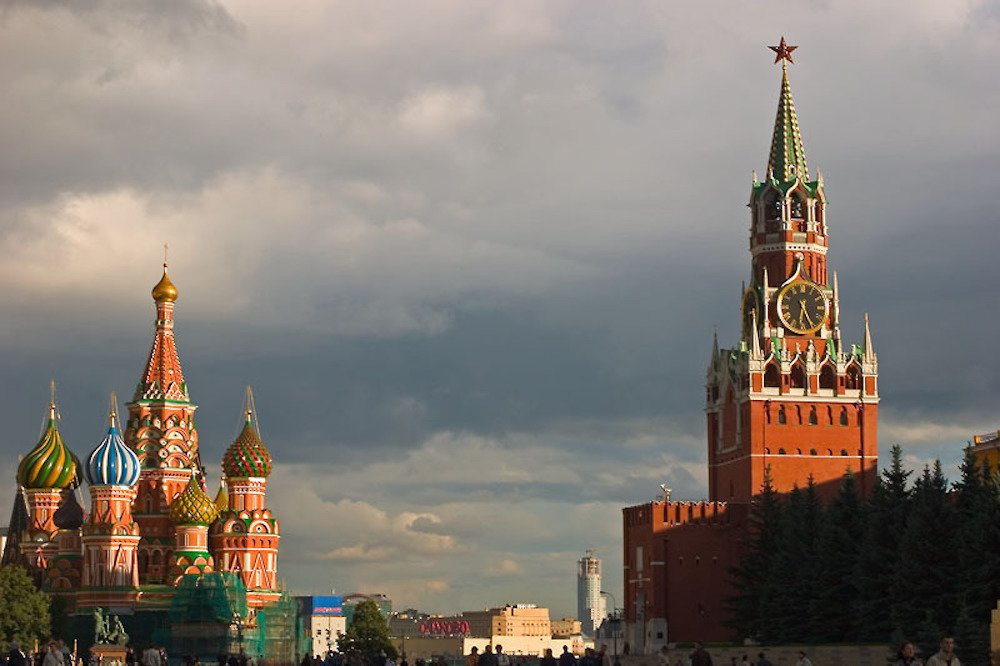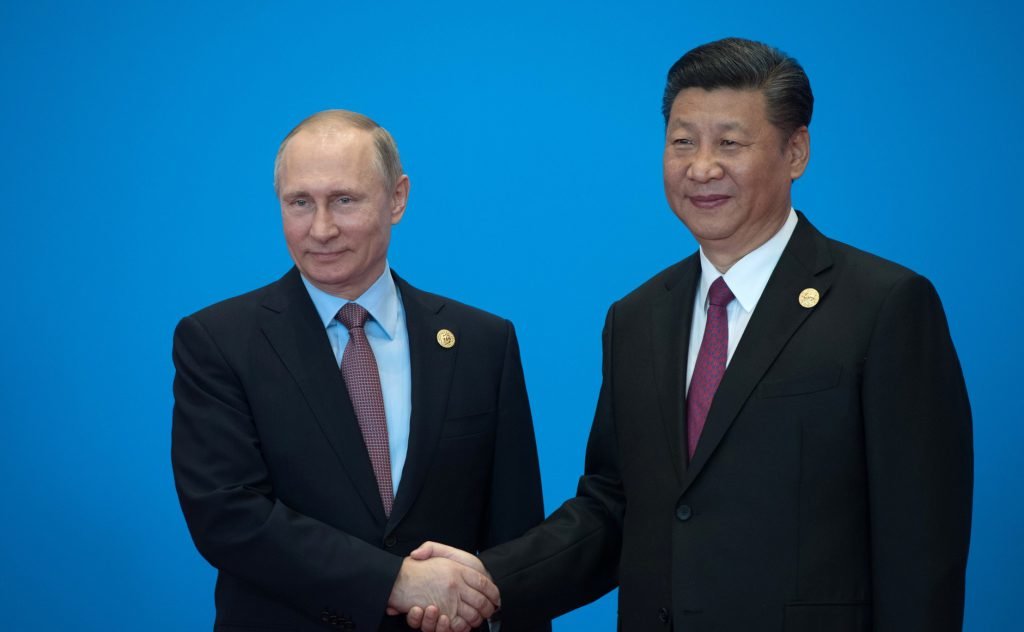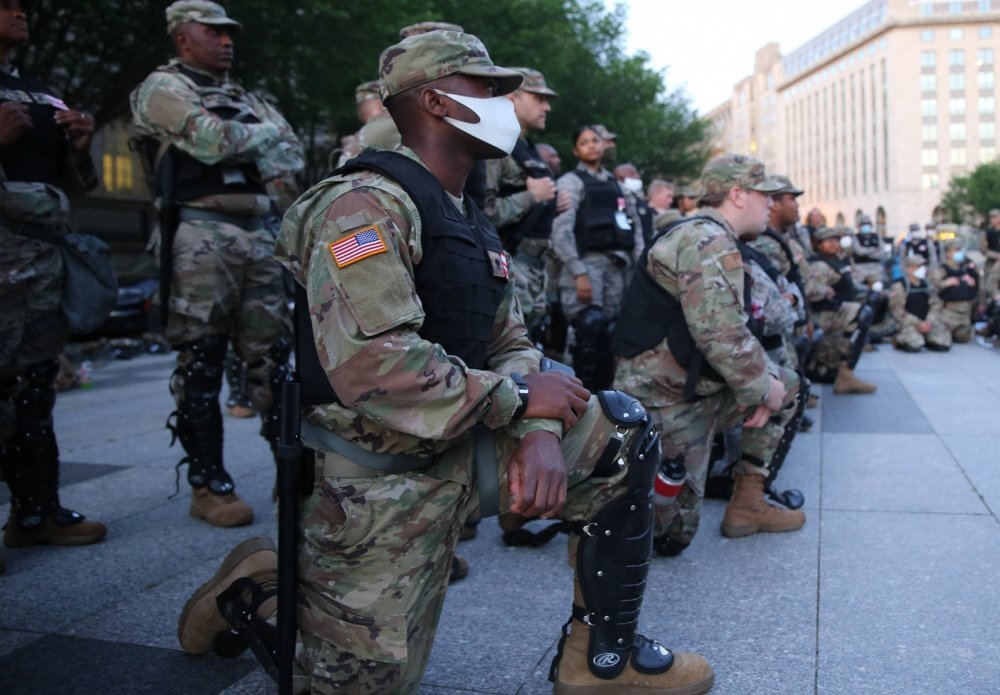Feds Charge Russian for Cybercrimes in Plot to Undermine American Elections and Sow Racial Discord

St. Basil’s Cathedral and Spasskaya Tower of Kremlin, Red Square, Moscow. Photo by Dmitry Azovtsev via Wikimedia Commons.
The Department of Justice charged a 27-year-old Russian man for committing financial crimes in support of an ongoing Russian cyber campaign to undermine America’s democracy and disrupt the electoral process.
The United States Secret Service filed an affidavit against Artem Lifshits — a Russian citizen who lives in St. Petersburg, Russia — with a federal court in Virginia on Thursday. The charges allege that Lifshits committed wire fraud and aggravated identity theft, both of which are federal felonies, while working as a manager for an ongoing, pernicious Russian influence operation targeting the US called Project Lakhta.
“Since at least May 2014, Project Lakhta’s stated goal in the United States was to disrupt the democratic process and to spread distrust towards candidates for political office and the political system in general,” the Secret Service affidavit said.
The US and Russia do not share an extradition agreement; therefore it’s unlikely that Lifshits will ever face trial in a US court. However, in addition to federal charges, Lifshits also faces sanctions from the US Department of the Treasury.
Russian Project Lakhta Member Charged with Wire Fraud Conspiracy https://t.co/AcZ407882z
— Justice Department (@TheJusticeDept) September 10, 2020
Lifshits allegedly began working for Project Lakhta in 2015. He rose through the ranks to head the so-called Translator Department by January 2017, allegedly gaining responsibility for much of Project Lakhta’s influence operations in the US, Justice said.
Conducting operations on social media platforms, such as YouTube, Facebook, Instagram, and Twitter, the Translator Department has an overarching goal to “sow discord in the United States political system, incite civil unrest, and polarize Americans by promoting socially divisive issues, with particular emphasis on racial divisions and inequality in the United States,” the affidavit said.
Lifshits allegedly stole Americans’ identities to open up fake bank accounts, cryptocurrency accounts, and PayPal accounts to help finance Project Lakhta’s covert influence campaign, as well as for personal gain.
“This case provides a clear illustration of how these malicious actors fund their covert foreign influence activities and Russia’s status as a safe-haven for cyber criminals who enrich themselves at others expense,” Assistant Attorney General for National Security John Demers said in a statement.

Project Lakhta operatives traveled to the US to collect intelligence and build a “computer infrastructure” in order to “reach millions of United States citizens through social media accounts operated under fictitious personas, including through the use of political advertisements,” federal court documents said.
To conceal its operations, Project Lakhta operated under the guise of multiple Russian cyber entities, including the St. Petersburg-based Internet Research Agency, or IRA.
Russia’s most notorious “troll farm,” the Internet Research Agency is a cyberwarfare unit that spreads deliberately inflammatory or provocative comments. According to a 2019 report by the Senate Intelligence Committee, the Internet Research Agency tried to stoke racial tensions in the US before the 2016 presidential election.
“No single group of Americans was targeted by IRA information operatives more than African Americans,” the Senate report found. “By far, race and related issues were the preferred target of the information warfare campaign designed to divide the country in 2016.”
In the run-up to the election, the Internet Research Agency reportedly posted more than 1,000 YouTube videos related to the Black Lives Matter movement and built up more than a million followers for its 30 Facebook pages targeting Black Americans. Russian cyber units have also had a hand in radicalizing far-right extremist groups in the United States.

The Internet Research Agency is reportedly financed in part by Russian oligarch Yevgeny Prigozhin, an ally of Russian President Vladimir Putin with ties to the Russian mercenary outfit Wagner.
A covert campaign of “active measures” — also known as ideological subversion or influence operations, or by the contemporary term “gray zone” warfare — was a means by which the Soviet Union had hoped to undermine American power during the Cold War.
In the post-Cold War era, America’s adversaries have carried on waging a quiet conflict against the US, using the internet and social media as direct portals to reach the American people.
Russia, for its part, has weaponized information by deploying its state-run media organizations to undermine Western societies and democratic institutions. Thus, by taking advantage of Americans’ historically low levels of confidence in journalism, Russia’s information warfare is precision-targeted on US citizens through the internet and social media. These activities have manipulated and inflamed divisions within American society.
To that end, Project Lakhta’s information operations are designed to create chaos, not to support any particular group or political ideology, officials say. The group particularly focused on exacerbating racial tensions in the US to stoke more widespread societal fractionalization and unrest.
According to the Secret Service affidavit: “Project Lakhta members also sought, in the words of one employee, to ‘effectively aggravate the conflict between minorities and the rest of the population.’”

Internal communications between Project Lakhta members, which were detailed in the Secret Service affidavit, often include derogatory language regarding racial minorities and LGBTQ people. The affidavit cites one internal Project Lakhta communication, which reads, in part: “Colored LGBT are less sophisticated than white; therefore, complicated phrases and messages do not work.”
Court documents also detail how Project Lakhta operatives, using fake online personas, used social media and other internet platforms to inflame passions on a wide variety of topics, including immigration, gun control, Confederate symbols, race relations, LGBTQ issues, women’s rights, and the National Football League national anthem debate.
According to the federal affidavit against Lifshits, around March 22, 2018, a Project Lakhta member used the Twitter account “@johncopper16” to comment on that year’s midterm elections, tweeting:
“Just a friendly reminder to get involved in the 2018 Midterms. They are motivated They hate you They hate your morals They hate your 1A and 2A rights They hate the Police They hate the Military They hate YOUR President.”
Another Project Lakhta Twitter account, using the handle @africamustwake, posted the following message:
“YOU POLICE BEEN KILLING BLACKS SINCE YA RAGGEDY MOMMAS GAVE BIRTH TO U. HAPPY MLK DAY TO U HYPOCRITES.”
“Project Lakhta conspirators used the stolen identities of US persons to further their goals of undermining faith in our democratic institutions and for personal gain,” US Attorney for the Eastern District of Virginia G. Zachary Terwilliger said in a statement. “This case demonstrates that federal law enforcement will work aggressively to investigate and hold accountable cyber criminals located in Russia and other countries, which serve as safe-havens for this type of criminal activity.”
Justice said that no American citizens were complicit in Project Lakhta’s subversive campaign.

BRCC and Bad Moon Print Press team up for an exclusive, limited-edition T-shirt design!
BRCC partners with Team Room Design for an exclusive T-shirt release!
Thirty Seconds Out has partnered with BRCC for an exclusive shirt design invoking the God of Winter.
Lucas O'Hara of Grizzly Forge has teamed up with BRCC for a badass, exclusive Shirt Club T-shirt design featuring his most popular knife and tiomahawk.
Coffee or Die sits down with one of the graphic designers behind Black Rifle Coffee's signature look and vibe.
Biden will award the Medal of Honor to a Vietnam War Army helicopter pilot who risked his life to save a reconnaissance team from almost certain death.
Ever wonder how much Jack Mandaville would f*ck sh*t up if he went back in time? The American Revolution didn't even see him coming.
A nearly 200-year-old West Point time capsule that at first appeared to yield little more than dust contains hidden treasure, the US Military Academy said.












